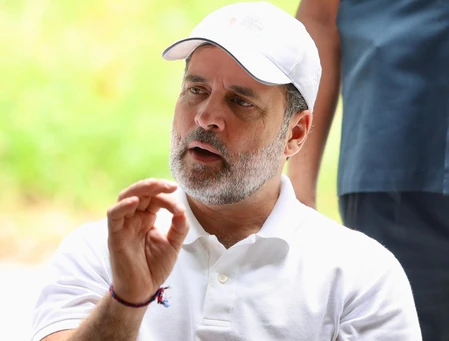New Delhi, Aug 25 In a paradoxical post-election saga, Congress has hailed its performance in the 2024 Lok Sabha elections as a historic revival, while simultaneously decrying widespread ‘vote chori’, or ‘vote theft’, that allegedly undermined its gains.
Backed by the INDIA Bloc, the party’s vote share climbed to unprecedented levels in over three decades, yet Leader of the Opposition (LoP) in Lok Sabha, Rahul Gandhi, has accused the Election Commission of India (ECI) of colluding with the ruling Bharatiya Janata Party in what they term criminal fraud.
This analysis delves into the data, historical trends, and the brewing political storm, highlighting the irony of a statistical resurgence clashing with claims of systemic manipulation.
According to data, the Congress party’s standalone vote share in 2024 reached 22.34 per cent, a significant increase from 19.49 per cent in 2019. This marks the highest individual share for the party since the early 1990s, signalling a potential shift in voter sentiment amid economic concerns, regional alliances, and anti-incumbency against the BJP.
When aggregated with its INDIA Bloc allies, the collective vote share soared to 40.6 per cent – the strongest performance for a Congress-led alliance since the late 1980s. However, later breakdowns in the data refine these figures slightly.
Congress alone is noted at 21.19 per cent, with the broader INDIA Bloc, referred to as the Congress+ alliance, achieving 41.33 per cent. This minor variance underscores the complexity of alliance dynamics but does not detract from the overall upward trajectory.
To contextualise this revival, consider the historical vote shares of the Congress party from 1989 to 2024, which tell a story of rise, fall, and unexpected resurgence, mirroring the shifting tides of Indian politics.
In 1989, the Congress+ alliance held a formidable 39.53 per cent vote share, but the party lost its grip on power, ushering in the era of coalition governments. The assassination of Rajiv Gandhi in 1991 brought a wave of sympathy, helping Congress return to power with 35.66 per cent, though it was a minority government led by PV Narasimha Rao. That term saw the birth of India’s economic liberalisation, but the party’s popularity waned by 1996, when its vote share dropped to 28.80 per cent.
The decline continued in 1998, falling to 25.82 per cent, as the BJP-led NDA gained ground and Sonia Gandhi’s leadership was still taking shape.
In 2009, the vote share rose to 28.55 per cent, buoyed by welfare schemes and the steady hand of Manmohan Singh. But the tide turned dramatically in 2014, when Congress collapsed to just 19.30 per cent, overwhelmed by the “Modi wave” and accusations of corruption.
The 2019 election offered only a modest recovery, with Congress inching up to 19.50 per cent. LoP Rahul Gandhi’s campaign had moments of resonance, but the BJP’s dominance remained unshaken. Then came 2024 – a turning point. Congress alone secured 21.19 per cent, and the INDIA Bloc surged to a combined 41.33 per cent, its highest in 35 years. The numbers suggest a powerful resurgence, even as the party cried foul over alleged vote chori.
The irony is unmistakable; while Congress accuses the system of betrayal, the data shows voters returning in force. The Congress+ alliance’s vote share from 1989 to 2024 reveals a compelling upward arc that culminates in a 41.33 per cent share in the most recent election — its highest in 35 years.
This trajectory challenges the party’s narrative of vote chori or electoral theft, suggesting instead a resurgence in popular support. The data shows a steady climb from a low of 26.4 per cent in 2014 to 31.99 per cent in 2019, and now a dramatic leap in 2024.
While Congress leaders allege manipulation, the numbers imply strategic consolidation and voter mobilisation. The irony is stark; the louder the cry of fraud, the clearer the statistical evidence of revival. Yet, the disconnect between vote share and seat count remains a thorn, fuelling suspicions and political drama.
The controversy has ignited a fierce political battle. Rahul Gandhi, as Leader of Opposition, accused the Election Commission of criminal fraud and collusion with the BJP, citing alleged irregularities in constituencies like Mahadevapura in Bangalore Central, where over 100,000 votes were reportedly fabricated.
LoP Rahul Gandhi’s claims include duplicate voters, invalid addresses, and mass misuse of Form 6 meant for new electors. Chief Election Commissioner Gyanesh Kumar has dismissed the allegations, asserting that the Commission stands like a rock behind Indian voters and challenged Gandhi to submit evidence under oath.
The Election Commission maintains that it does not discriminate between ruling and opposition parties, despite mounting pressure from the INDIA Bloc, which is now reportedly considering an impeachment motion against the CEC.
Congress is demanding the release of electronic voter lists from key constituencies, including Prime Minister Modi’s Varanasi seat, to verify alleged fraud.
BJP leaders, meanwhile, have countered with accusations of vote theft in opposition-held seats, further muddying the post-election narrative.
As the dust settles on India’s largest-ever election, the paradox remains. A resurgent Congress, buoyed by its strongest vote share in 35 years, finds itself locked in a bitter dispute over the legitimacy of the very process that delivered its revival.
The nation watches closely as the battle shifts from ballots to courtrooms and press briefings.
